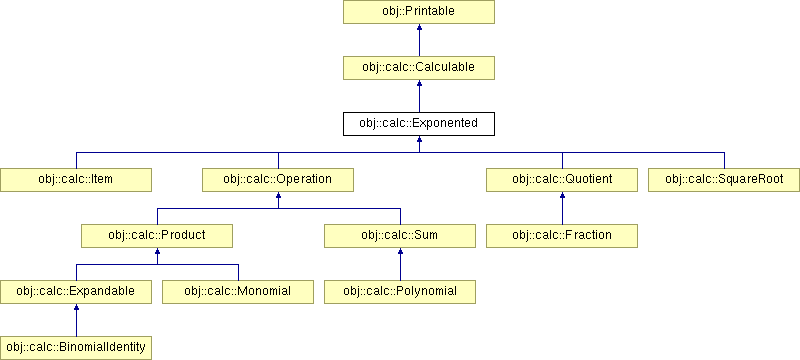obj::calc::Exponented Class Reference
Exponented objects: Operations (Sums&Products), Items, Quotients. More...

Public Member Functions | |
| def | __mul__ |
| Synonym to times(). | |
| def | __add__ |
| Synonym to plus(). | |
| def | get_sign |
| Returns the sign or the sign of the first element of the object. | |
| def | get_minus_signs_nb |
| Returns the number of minus signs in the object. | |
| def | set_exponent |
| Set the value of the exponent. | |
| def | set_sign |
| Set the sign of the Exponented object. | |
| def | set_opposite_sign |
| Changes the sign of the Exponented object. | |
| def | multiply_symbol_is_required |
| True if the usual writing rules require a × between two factors. | |
| def | requires_brackets |
| True if the argument requires brackets in a product For instance, a Sum with several terms or a negative Item. | |
| def | requires_inner_brackets |
| True if the argument requires inner brackets The reason for requiring them is having an exponent different from 1 and several terms or factors (in the case of Products & Sums). | |
| def | exponent_must_be_displayed |
| True if the exponent isn't equivalent to a single 1. | |
| def | contains_exactly |
| True if the object contains exactly the given objct It can be used to detect objects embedded in a Sum or a Product that contain only one term (or factor). | |
| def | contains_a_rounded_number |
| To check if this contains a rounded number. | |
| def | calculate_next_step |
| Returns the next Exponented object during a numeric calculation. | |
| def | expand_and_reduce_next_step |
| Returns the next step of expansion/reduction of the Sum So, either the Sum of its expanded/reduced terms, or the Sum itself reduced, or None. | |
Detailed Description
Exponented objects: Operations (Sums&Products), Items, Quotients.
.. Any Exponented must have a exponent field and should reimplement the methods that are not already defined hereafter
Definition at line 787 of file __init__.py.
Member Function Documentation
| def obj::calc::Exponented::contains_a_rounded_number | ( | self | ) |
To check if this contains a rounded number.
..
- Returns:
- True or False
Reimplemented in obj::calc::Item, obj::calc::SquareRoot, obj::calc::Operation, and obj::calc::Quotient.
Definition at line 966 of file __init__.py.
| def obj::calc::Exponented::contains_exactly | ( | self, | ||
| objct | ||||
| ) |
True if the object contains exactly the given objct It can be used to detect objects embedded in a Sum or a Product that contain only one term (or factor).
- Parameters:
-
objct The object to search for
- Returns:
- True if the object contains exactly the given objct
Reimplemented in obj::calc::Item, obj::calc::SquareRoot, obj::calc::Operation, and obj::calc::Quotient.
Definition at line 954 of file __init__.py.
| def obj::calc::Exponented::expand_and_reduce_next_step | ( | self, | ||
| options | ||||
| ) |
Returns the next step of expansion/reduction of the Sum So, either the Sum of its expanded/reduced terms, or the Sum itself reduced, or None.
- Returns:
- Exponented
Reimplemented in obj::calc::Item, obj::calc::SquareRoot, obj::calc::Product, obj::calc::Sum, obj::calc::Fraction, obj::calc::Expandable, and obj::calc::BinomialIdentity.
Definition at line 990 of file __init__.py.
| def obj::calc::Exponented::exponent_must_be_displayed | ( | self | ) |
True if the exponent isn't equivalent to a single 1.
- Returns:
- True if the exponent is not equivalent to a single 1
Definition at line 937 of file __init__.py.
| def obj::calc::Exponented::multiply_symbol_is_required | ( | self, | ||
| objct, | ||||
| position | ||||
| ) |
True if the usual writing rules require a × between two factors.
- Parameters:
-
objct The other one position The position (integer) of self in the Product
- Returns:
- True if the writing rules require × between self & obj
Reimplemented in obj::calc::Item, obj::calc::SquareRoot, obj::calc::Product, obj::calc::Sum, and obj::calc::Quotient.
Definition at line 898 of file __init__.py.
| def obj::calc::Exponented::requires_brackets | ( | self, | ||
| position | ||||
| ) |
True if the argument requires brackets in a product For instance, a Sum with several terms or a negative Item.
- Parameters:
-
position The position of the object in the Product
- Returns:
- True if the object requires brackets in a Product
Reimplemented in obj::calc::Item, obj::calc::SquareRoot, obj::calc::Product, obj::calc::Sum, and obj::calc::Quotient.
Definition at line 912 of file __init__.py.
| def obj::calc::Exponented::requires_inner_brackets | ( | self | ) |
True if the argument requires inner brackets The reason for requiring them is having an exponent different from 1 and several terms or factors (in the case of Products & Sums).
- Returns:
- True if the object requires inner brackets
Reimplemented in obj::calc::Item, obj::calc::SquareRoot, obj::calc::Product, obj::calc::Sum, and obj::calc::Quotient.
Definition at line 925 of file __init__.py.
| def obj::calc::Exponented::set_exponent | ( | self, | ||
| arg | ||||
| ) |
Set the value of the exponent.
- Parameters:
-
arg Calculable|Number|String
- Warning:
- Relays an exception if arg is not of the types described
Reimplemented in obj::calc::Product.
Definition at line 836 of file __init__.py.
| def obj::calc::Exponented::set_opposite_sign | ( | self | ) |
Changes the sign of the Exponented object.
- Parameters:
-
arg String being '+' or '-' or number being +1 or -1
- Warning:
- Relays an exception if arg is not of the types described
Definition at line 875 of file __init__.py.
| def obj::calc::Exponented::set_sign | ( | self, | ||
| arg | ||||
| ) |
Set the sign of the Exponented object.
- Parameters:
-
arg String being '+' or '-' or number being +1 or -1
- Warning:
- Relays an exception if arg is not of the types described
Reimplemented in obj::calc::Operation, and obj::calc::Monomial.
Definition at line 851 of file __init__.py.
The documentation for this class was generated from the following file:
- mathmaker_dev/obj/calc/__init__.py
 1.6.3
1.6.3